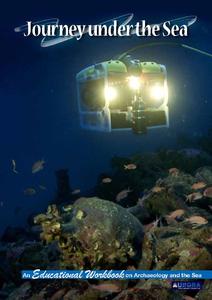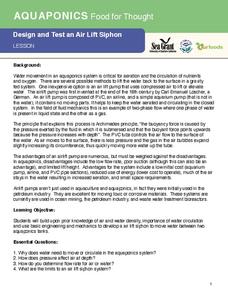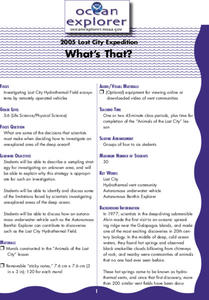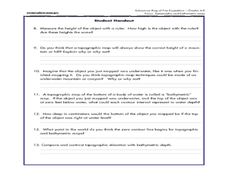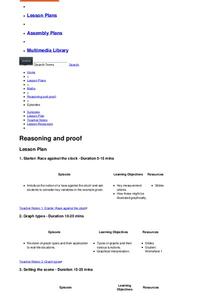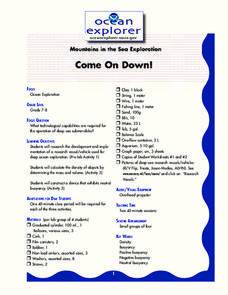Curated OER
Where's Dinner?
Upcoming marine biologists consider a list of organisms residing near the Lost City hydrothermal vents and construct a food web. They compare the food web to that of a cold seep community, of which they should have previous knowledge....
Aurora Trust
Journey Under the Sea
Discover the interesting world of maritime archaeology and explorations under the sea with this nice set of worksheets, which cover such topics as search tools and techniques of underwater archaeology, carbon dating,...
Teach Engineering
Archimedes' Principle, Pascal's Law and Bernoulli's Principle
What do Pascal's law, Archimedes' Principle, and Bernoulli's Principle have to do with fluid mechanics? The included PowerPoint presentation provides the basic definitions and equations associated with the three. A set of homework...
Teach Engineering
Cartesian Diver
Amaze your scholars with an activity that uses a Cartesian diver to demonstrate Pascal's Law, Archimedes' Principle, and the Ideal Gas Law. Groups then repeat the process and make their own diver move up and down in a bottle.
NOAA
Community Ecology and Sampling
Seamounts in the Coral and Tasman Seas are home to more than 850 different species. Groups explore hydrothermal vents, researching the organisms found there and their energy source. They also learn about seamounts, exploring their unique...
NOAA
Biological Oceanographic Investigations – Through Robot Eyes
How can a robot measure the length of something when we don't know how far the camera is from the object? The instructional activity explains the concept of perspective and many others. Scholars apply this knowledge to judge the length...
NOAA
Biological Oceanographic Investigations – I, Robot, Can Do That!
How do you decide the best person for each job? Would it be easier if you didn't have to consider their feelings? The lesson begins with a discussion of underwater robots. Then groups research one of these robots and present their...
University of Southern California
Design and Test an Air Lift Siphon
Build an air lift siphon using your mad physics skills! Learners first investigate the importance of circulating water in aquaponics systems. They then use density to their advantage as they engineer an air lift siphon
Centers for Ocean Sciences
Ocean and Great Lakes Literacy: Principle 7
Your mission, should you choose to accept it, is to take your class on an underwater adventure. The final installment in a seven-part series involving salt and freshwater bodies takes junior oceanographers below the surface in...
Science Matters
Blubber Gloves: It’s All About Insulation
Instill the concept of adaptation with the help of Blubber Gloves—ziplock bags, shortening, and duct tape. Scholars discuss how animals and plants keep warm in polar regions, record their predictions, and try on their Blubber Gloves to...
American Museum of Natural History
Dive Into Worlds Within the Sea
The ocean is a series of ecosystems within an ecosystem. Learners dive into an exploration of ecosystems in an interactive lesson. They identify connections between organisms by following leading prompts within the lesson. The resource...
American Museum of Natural History
Dive Into Worlds Within the Sea
Make connections between ocean organisms. Individuals explore three different ecosystems in the ocean. With an online interactive, they learn how different organisms depend upon each other. Learners first answer questions to connect...
Curated OER
ROV Grid Search
Learners perform activities to recreate the exploration of the sea bottom. They attach magnets to the bottom of the remote controlled car to see how many camouflaged objects it can pick up. As a class, students examine the results of...
Curated OER
The Eyes Have It!
Reading essays about deep-sea expeditions open this lesson on crustacean vision. Marine biology explorers study the compound eye and then complete a worksheet in response to all they have discovered. Although the lesson doesn't offer an...
Curated OER
What's That?
Meant to be a simulation of a deep-sea exploration, this requires that another lesson be completed first. In that lesson, titled "Animals of the Lost City," marine biology buffs construct murals of benthic communities. In this lesson,...
Curated OER
Strange Bugs
As individuals or in small groups, marine biologists research and discuss archaea and their unusual behavior as compared to bacteria. Teach them about the chemical makeup of the cell membrane of these strange organisms. This complex...
Curated OER
Massif Mystery
After reviewing plate tectonic theories and the discovery of both the Atlantis Massif and the Lost City hydrothermal vents, earth science learners complete a worksheet and participate in discussions about what the types of rock found...
Curated OER
Finding the Way
Learners identify and research navigational tools used in deep sea explorations. They are introduced to a compass, the Global Positioning System and sonar technology and then describe their uses in underwater exploration.
Curated OER
Depth Line
Students use adding machine tape to plot increasing ocean depths and deep sea historical events.
Curated OER
Journey to the Unknown
Learners explore the ocean depths. In this scenario based lesson, students pretend they are on a submarine in an unknown part of the ocean. By using clues the class discusses and determines where they are in the ocean. They follow up...
Curated OER
A Watered-Down Topographic Map
Eighth graders explore the ocean floor. In this topography lesson, 8th graders compare topographical maps to bathymetric charts. They will create a topographic map and note landmarks and other land features.
Curated OER
Maps
Students investigate three types of maps. In this history instructional activity, students idenitfy different maps and explore how they relate to the area, while keeping climate and topography in mind. They discuss maps used to...
Curated OER
Sea Connections: Marine Ecosystems
Students identify producers and consumers from marine ecosystems and describe the balance among them in the environments. After constructing a food chain from a marine ecosystem, they examine human activities that can upset the balance...
Curated OER
Come On Down!
Students research the implementation of a research vessel used for ocean exploration. In buoyancy lesson students will construct a device that shows neutral buoyancy.



